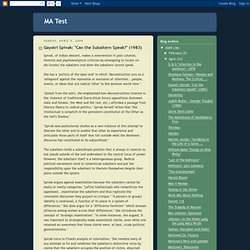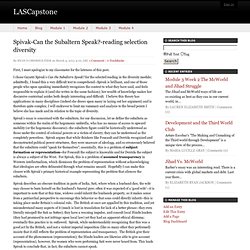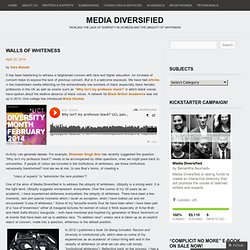

Explaining White Privilege to a Broke White Person. MA Test: Gayatri Spivak: "Can the Subaltern Speak?" (1983) Spivak, of Indian descent, makes a intervention in post-colonial, feminist and psychoanalytical criticism by attempting to locate (or dis-locate) the subaltern and show the subaltern cannot speak.

"Can the Subaltern Speak?" Spivak-Can the Subaltern Speak?-reading selection diversity - LASCapstone. First, I must apologize to my classmates for the lateness of this post.

I chose Gayatri Spivak's Can the Subaltern Speak? For the selected reading in the diversity module; admittedly, I found this a very difficult text to comprehend--Spivak is brilliant, and one of those people who upon speaking immediately recognizes the context to what they have said, and feels responsible to explain it (and she writes in the same fashion); her wealth of knowledge makes her discursive contextual asides both deeply interesting and difficult. I believe this theory has applications in many disciplines (indeed she draws upon many in laying out her argument) and is therefore quite complex; I will endeavor to limit my summary and analysis to the broad points I believe she has made and its relation to the topic of diversity.
In Hindu religion, there are four stages of life individuals are expected to go through: "Student (celibacy and preparation for life) [...] Works Cited: Aboul-Hosn, S., 2009. Types of cis bigots I am quite tired of (a bit of a rant, this) Feminism 101. Eve Mitchell’s critique of intersectionality theory from a Marxist-Feminist perspective. In the United States, during the late 20th and early 21st centuries, a specific set of politics among the left reigns king. Today, you could go into any university, on any number of liberal-to-left blogs or news websites, and the words “identity” and “intersectionality” will jump out you as the hegemonic theory. But, like all theories, this corresponds to the activity of the working class in response to the current composition of capital. Theory is not some cloud that floats above the class, raining down thoughts and ideas, but, as Raya Dunayevskaya writes,”the actions of the proletariat create the possibility for the intellectual to work out theory” (Marxism and Freedom, 91).
Being Mixed Race: Am I A Human Rorschach Test? By Glen Chisholm Just last week I was standing at a bus stop when a gentleman; a complete stranger came and joined me.

Nothing unusual about that, we then politely nodded at each other and a conversation started up. Me: “Evening” Stranger: “Evening” Me: “it’s still quite warm isn’t it” Stranger: “yes it is”; pause; “excuse me mate, but were do you come from?” Privilege. New Comic!

Note: A version of this comic without the word ‘fuck’ can be found here. Another note: a poster of this comic can be purchased here. Another another note: A Swedish version of this comic can be found here. Oh my, another long one. Walls of Whiteness. By Sara Ahmed It has been heartening to witness a heightened concern with race and higher education.

An increase of concern helps to expose the lack of previous concern. But is it a welcome exposure. We have had articles in the mainstream media reflecting on the extraordinarily low numbers of black (especially black female) professors in the UK as well as events such as “Why isn’t my professor black?” In which black voices have spoken about the relative absence of black voices. Explainer: What's an MRA? From time to time, it's good to remember that not everyone knows the lingo of the feminist and pro-feminist folks here at the Village of Shakes.

In an ongoing quest to educate our readership, I want to take the time to explain a term I've thrown around liberally: MRA. What is an MRA? He's a Men's Rights Activist, part of the broader Men's Rights Movement. He-- Wait, wait. Yes. Venezuela shows that protest can be a defence of privilege. Link to video: Venezuelan president Nicolás Maduro: 'We are all a little bit hippy, a little bohemian' If we didn't know it before, the upsurge in global protest in the past couple of years has driven home the lesson that mass demonstrations can have entirely different social and political meanings.

Just because they wear bandannas and build barricades – and have genuine grievances – doesn't automatically mean protesters are fighting for democracy or social justice. From Ukraine to Thailand and Egypt to Venezuela, large-scale protests have aimed at, or succeeded in, ousting elected governments in the past year. In some countries, mass protests have been led by working class organisations, targeting austerity and corporate power. In others, predominantly middle class unrest has been the lever to restore ousted elites. Sometimes, in the absence of political organisation, they can straddle the two. Support for the government, meanwhile, remains solid in working class areas.
A TED Talk That Might Turn Every Man Who Watches It Into A Feminist? It's Pretty Fantastic. The Difference Between Cultural Exchange and Cultural Appropriation.